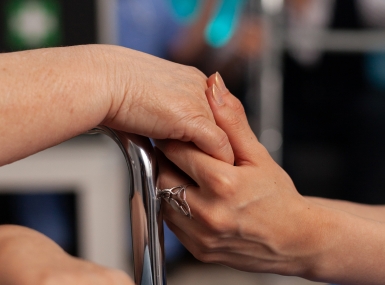Messaging to Support a Behavioral Health Continuum of Care: Intellectual and Developmental Disability Directors

Upcoming Events
Related News
Counties play a critical role in supporting community members living with behavioral health conditions or experiencing a behavioral health crisis. Annually, counties allocate $100 billion to community health systems – including behavioral health – and provide services through 750 behavioral health authorities and community providers.¹ This funding supports prevention, treatment, and recovery services as well as the elements of a continuum of care – someone to contact, someone to respond and somewhere safe to go – when people are experiencing a behavioral health crisis.
County leaders have been successful investing in and supporting a behavioral health continuum of care through communicating that provision of necessary services improves community mental health, saves taxpayer money, allows law enforcement to focus efforts on public safety responsibilities, reduces the overuse and misuse of the criminal legal system and decreases the reliance on emergency rooms.
Introduction
Counties play a critical role in supporting community members living with behavioral health conditions or experiencing a behavioral health crisis. Annually, counties allocate $100 billion to community health systems – including behavioral health – and provide services through 750 behavioral health authorities and community providers.¹ This funding supports prevention, treatment, and recovery services as well as the elements of a continuum of care – someone to contact, someone to respond and somewhere safe to go – when people are experiencing a behavioral health crisis.
County leaders have been successful investing in and supporting a behavioral health continuum of care through communicating that provision of necessary services improves community mental health, saves taxpayer money, allows law enforcement to focus efforts on public safety responsibilities, reduces the overuse and misuse of the criminal legal system and decreases the reliance on emergency rooms.
Intellectual and Developmental Disability Directors
Intellectual and developmental disability directors (I/DD) work to support and maximize opportunities for intellectually and developmentally disabled community members through building comprehensive continuums of care. By administering services such as crisis stabilization, workforce support and home-based care, I/DD directors build systems that empower intellectually and developmentally disabled people with dignity, independence, and respect.
Polk County, Iowa
(Population: 492,401)

In 2021, the U.S. Department of Justice released an investigative report regarding treatment of residents with I/DD in Iowa’s state-run institutional centers that concluded bias and lack of integration in community-based crisis services for people with I/DD. To address this need, Polk County contracted with Easterseals² Iowa to implement a crisis stabilization program designed to serve these individuals. Easterseals’ residential and community-based programs help bridge I/DD care by offering support services to adults and children, both during and following crises.
"As a region, we’re responsible for ensuring access to an array of mental health crisis supports and services. Shortly after this report came out, it became clear to us that it was important to partner with a crisis provider that not only provided critical mental health services, but also understood the unique needs of those with an intellectual or developmental disability."
– Annie Uetz, CEO, Polk County Behavioral Health and Disability Services
Champaign County, Ill.
(Population: 205,865)

As a testament to the county’s mission to create a diverse, inclusive community, Champaign County Developmental Disabilities Board and Champaign County Mental Health Board co-host an annual DISABILITY Resource Expo event that is planned and prepared by members of the disability community and their supporters. The purpose of the Expo is to connect people with disabilities to empowering resources and build connections between the I/DD community, service providers and public service organizations. This popular event features a multitude of vendors, including advocacy groups, equipment merchants, artists and authors who have disabilities.
"The importance of putting these voices front and center extends beyond our I/DD service system focus and supports the explicit goals of county government and many partners, to make this community inclusive and welcoming. We learn so much – about what matters and what is most likely to help us achieve that – from listening to self-advocates and meeting them and their families during our annual event.”
– Lynn Canfield, Executive Director at Champaign County Mental Health Board and Champaign County Developmental Disabilities Board
El Paso County, Texas
(Population: 865,657)

El Paso has built a historic bridge between local mental health authorities and law enforcement by housing both Crisis Intervention Services (CIS) for I/DD and mental health and Crisis Intervention Team (CIT) within the same Crisis Emergency Services division. This collaboration has improved the safety of individuals with I/DD through providing specialized training and resources to law enforcement to improve incident response after hours or when CIT is not available.
"As the Intellectual & Developmental Disabilities Authority for our community, EHN is committed to offering services of the highest level of quality to individuals and families. We are extremely fortunate to have fantastic partners who devote valuable resources to ensure those with the highest need have access to specialized care."
– Kristi Daugherty, CEO Emergence Health Network
Sources
- National Association of Counties, “Behavioral Health Matters to Counties,” (March 4, 2021) available at https://www.naco.org/sites/default/files/documents/Behavioral%20 Health%20Matters_1.pdf (January 31, 2023)
- Polk County, Iowa contracted Easterseals to administer mobile response, crisis stabilization services and case management as reflected in the county’s budget: https://hhs.iowa.gov/sites/default/files/09-Polk-FY23-ASBP.pdf
Featured Initiative
NACo Commission on Mental Health and Wellbeing
Launched in February 2023, the NACo Commission on Mental Health and Wellbeing brings together county leaders from across the nation to take action to address the ever-growing mental health crisis from the county government perspective.









